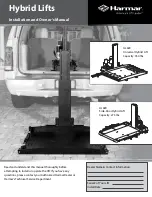
5
PORTA
GANTRY
RAPIDE
Intended Use
This product is designed, tested and intended to be
used for the lifting of goods, the lifting of personnel
or for providing a safety anchor for the prevention
of falls as part of a personal fall protection system.
(PFAS). The use of our products for these multiple
applications is consistent with the products
design, notwithstanding pre-user inspections and
mandatory inspections by a competent or qualified
person, determined by local regulations.
Maximum Capacity
Lifting of Goods:
Each product will be marked with
a Working Load Limit (WLL). The WLL is specifically
intended as a maximum limit for the lifting of
goods, materials and equipment and includes
safety factors. When using modular gantries, due
to the interchangeability of A frames and beams to
suit the customers need, the lowest rated element
of the gantry always takes precedent. A-frames are
independently marked with a WLL for safety.
Lifting of Personnel:
For the lifting of personnel
REID Lifting will reduce the WLL by half, thereby
increasing the safety factor of the product. As
for lifting goods, materials and equipment, the
lowest rated element of the Gantry always takes
precedent. Associated equipment used for lifting
personnel must be rated accordingly. It is the
employers’ responsibility to ensure this is the case.
For example, a winch must be personnel rated and
where necessary, meet applicable standards and
regulations for the country of use.
Correct Operation
This product has different ratings depending
upon the application as detailed in the table
below:
For fall protection applications see page 7.
Inspection Prior to Initial Operation
This product must be inspected prior to initial
operation by a competent person to ensure that the
structure is safe and that it has not been damaged
by incorrect assembly, transport or storage.
Inspection Before Starting Work
Before starting work, the assembly of the product
and all load-bearing components should be
checked for visual defects. This includes checking
the integrity of all profiles for denting, making sure
there is no wear or elongation on the bolt holes
and ensuring that the trolley moves freely along
the beam.
Temperature Range
This product can be operated in ambient dry
temperatures between –20°C and +55°C (-4°F
and 131°F). Consult your supplier in case of
extreme working conditions.
Notes for Correct Operation
For optimum safety, we recommend single
person assembly to avoid conflicting actions.
Assemble only as instructed (ensure all
bolts are present and fitted correctly as per
instructions).
Suitable, appropriately rated winches and
connection plates must be used for all
applications.
The product should be set up at a safe
distance from the hazard or lift area, before
moving the structure into place.
The supporting ground/structure where
the gantry is to be used must be stable
and capable of withstanding the maximum
expected load applied during use.
We recommend that appropriate PPE is worn
when using the equipment.
The beam must be horizontal prior to any lift
and A-Frames vertical and parallel to each
other.
Do not use the product if the trolley does
not run freely along the beam. (For certain
applications, such as when the system is being
used as a restraint point, the trolleys can be
locked into position).
Fall Protection Anchor:
In most cases (subject
to labelling and instructions for use for specific
products confirming this) REID lifting products are
tested and meet the requirements of fall protection
standards and regulations, including EN795:2012,
CEN TS 16415:2013 and IRATA ICOP as referenced
in our Instructions for Use. The WLL on the beam
or A-frame is of no relevance to fall protection
standards and requirements and the user should
refer to the specific sections of the instructions for
use, for detailed information. For example; EN795
requires that anchors that form part of a personal
fall protection system are capable of withstanding
a minimum 12kN static load for a single user and a
further 1kN for each additional user. IRATA requires
a 15kN static loadAdditionally, fall protection
systems are required to pass a series of dynamic
performance tests. REID Lifting products will,
where applicable be marked with the rating for
fall protection. Safety factors will be higher than
those for lifting and forces will be limited by the use
of personal fall protection equipment, including
load limiting devices such as shock absorbers or
self-retracting lifelines that reduce impact forces,
typically to a maximum of 6kN per user as required
by law.
Note: some jurisdictions may not allow the same
equipment to be used for lifting of materials and as
a component of a PFAS. Some employers may also
prefer to keep such equipment distinctly separate.
If this is the case, we would recommend that the
equipment is labelled accordingly Check your local
regulations before putting equipment to use and
designate accordingly.
It is expected that all users of this product have
the necessary medical and physical capabilities,
are fully trained and deemed competent in its
safe assembly and use. We would remind users
of the requirement to ensure that work is properly
planned, risk assessments carried out and as
required, method statements for carrying out work
provided.
Where required the owner/user of the equipment
should ensure that a qualified person has been
consulted in respect of the need for structural
validation, for example (but not limited to);
calculating imposed loads for the safety of ground,
floor or roof structures during lifting operations.
Model
PGRS20
PGRS23, PGRM20,
PGRM23
PGRS40, PGRM40,
PGRT20, PGRT23,
PGRT40
Application
WLL (kg)
WLL (kg)
WLL (kg)
Personnel
positioning
limit
250
200
125
Goods
500
400
250
Model
PGR1TS20, PGR1TS30, PGR1TS40, PGR1TM20,
PGR1TM30, PGR1TM40, PGR1TT20, PGR1TT30, PGR1TT40
Application
WLL (kg)
Personnel
positioning limit
500
Goods
1000
The system is not suitable for fall arrest
applications.
The system is suitable for fall arrest applications. Specify
number of users. Max weight of 150kg.




































